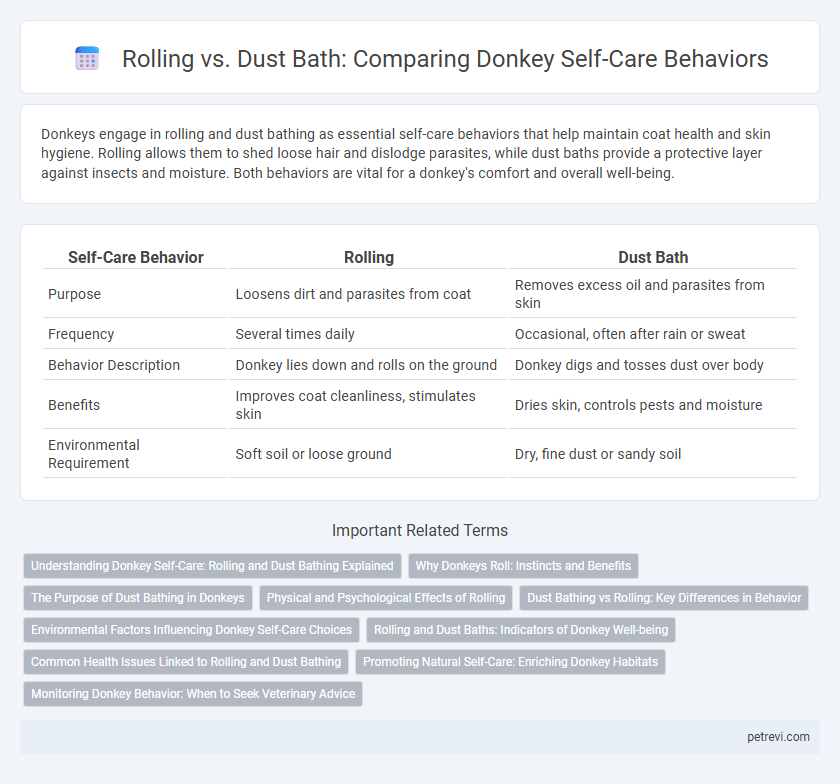Donkeys engage in rolling and dust bathing as essential self-care behaviors that help maintain coat health and skin hygiene. Rolling allows them to shed loose hair and dislodge parasites, while dust baths provide a protective layer against insects and moisture. Both behaviors are vital for a donkey's comfort and overall well-being.
Table of Comparison
| Self-Care Behavior | Rolling | Dust Bath |
|---|---|---|
| Purpose | Loosens dirt and parasites from coat | Removes excess oil and parasites from skin |
| Frequency | Several times daily | Occasional, often after rain or sweat |
| Behavior Description | Donkey lies down and rolls on the ground | Donkey digs and tosses dust over body |
| Benefits | Improves coat cleanliness, stimulates skin | Dries skin, controls pests and moisture |
| Environmental Requirement | Soft soil or loose ground | Dry, fine dust or sandy soil |
Understanding Donkey Self-Care: Rolling and Dust Bathing Explained
Donkeys exhibit self-care behaviors such as rolling and dust bathing to maintain coat health by removing parasites and excess oils. Rolling helps dislodge dirt and debris, while dust bathing creates a protective layer against insects and moisture. These behaviors are vital for thermoregulation and skin protection, enhancing overall donkey wellbeing.
Why Donkeys Roll: Instincts and Benefits
Donkeys roll primarily to maintain healthy skin and coat by loosening dirt, parasites, and dead hair, which promotes natural grooming and reduces irritation. This instinctive behavior also aids in thermoregulation, helping donkeys cool down or warm up depending on environmental conditions. Rolling stimulates circulation and supports overall well-being, making it a crucial self-care practice for donkey health.
The Purpose of Dust Bathing in Donkeys
Dust bathing in donkeys serves as a natural behavior aimed at maintaining skin health and parasite control by allowing dust particles to absorb excess oils and dislodge external parasites. Unlike rolling, which primarily aids in muscle relaxation and thermoregulation, dust bathing provides a crucial hygienic function that supports the donkey's overall well-being. This self-care behavior enhances the donkey's coat condition, reduces irritation, and promotes comfort through effective removal of pests and debris.
Physical and Psychological Effects of Rolling
Rolling serves as a critical self-care behavior for donkeys, promoting effective coat maintenance by removing dirt, parasites, and excess oils, which supports healthy skin and fur conditions. Physically, rolling stimulates blood circulation and muscle relaxation, reducing tension and enhancing overall comfort. Psychologically, rolling contributes to stress relief and behavioral enrichment, fostering emotional well-being and reducing signs of boredom or anxiety in donkeys.
Dust Bathing vs Rolling: Key Differences in Behavior
Dust bathing in donkeys involves the animal vigorously tossing dirt onto its body to absorb moisture and oils, aiding in parasite control and skin health, whereas rolling consists of the donkey lying on its side and rolling back and forth to relieve itches and remove loose hair. Dust bathing is generally a more systematic and sustained behavior aimed at hygiene, while rolling is often a shorter, immediate reaction to discomfort or irritants. Both behaviors are vital for maintaining the donkey's skin condition but serve distinct physiological and comfort-related purposes.
Environmental Factors Influencing Donkey Self-Care Choices
Environmental factors such as soil texture, humidity levels, and ambient temperature significantly influence donkey self-care behaviors like rolling versus dust bathing. Donkeys tend to prefer rolling on loose, soft soil to dislodge parasites when ground moisture is low and dust bathing in dry, dusty environments to maintain coat health. Availability of suitable substrate, shade coverage, and seasonal weather variations further dictate the frequency and method of these essential grooming practices.
Rolling and Dust Baths: Indicators of Donkey Well-being
Rolling and dust baths are essential self-care behaviors in donkeys, serving as indicators of their overall well-being and comfort. These activities help donkeys maintain coat health by removing parasites, dirt, and excess oils, which supports skin condition and reduces irritation. Monitoring the frequency and quality of rolling and dust bathing can provide valuable insights into the health status and stress levels of donkeys in various environments.
Common Health Issues Linked to Rolling and Dust Bathing
Rolling and dust bathing are essential self-care behaviors for donkeys that help control parasites and maintain skin health. However, excessive rolling can cause abrasions and skin infections, while frequent dust bathing in contaminated areas may lead to respiratory issues and fungal infections. Monitoring these behaviors ensures early detection of common health problems such as dermatitis, alopecia, and respiratory distress in donkeys.
Promoting Natural Self-Care: Enriching Donkey Habitats
Donkeys engage in rolling and dust bathing as essential self-care behaviors that help regulate body temperature, control parasites, and maintain skin health. Providing enriched habitats with access to soft soils and ample dusting areas encourages these natural behaviors, supporting overall welfare and reducing stress. Habitat enrichment tailored to promote rolling and dust bathing enhances donkeys' physical and psychological well-being by mimicking their natural environment.
Monitoring Donkey Behavior: When to Seek Veterinary Advice
Monitoring donkey behavior during rolling and dust baths is crucial for assessing their health and well-being, as these self-care actions aid in skin parasite control and coat maintenance. Excessive or abnormal behavior, such as persistent rolling or dust bathing beyond typical frequencies, may indicate underlying issues like skin irritation or stress that require veterinary evaluation. Timely observation of changes in self-care routines enables early detection of health concerns, ensuring prompt veterinary intervention and improved donkey welfare.
Rolling vs Dust Bath for Donkey Self-care Behavior Infographic

 petrevi.com
petrevi.com